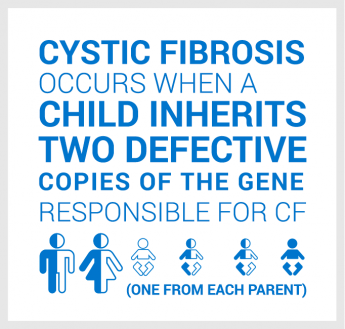Annual Data Report compiled by Canadian Cystic Fibrosis Registry finds progress is being made, but there is still further to go
Annual Data Report compiled by Canadian Cystic Fibrosis Registry finds progress is being made, but there is still further to go
Report released by Cystic Fibrosis Canada today provides valuable insights about cystic fibrosis in Canada
Toronto (December 8, 2020) - Today Cystic Fibrosis Canada released the Canadian Cystic Fibrosis Registry’s 2019 Annual Data Report, which has been generated regularly since 1976, examining key trends as well as health outcomes for people living with cystic fibrosis across Canada. Insights from the 2019 report support that early diagnoses, as well as advancements in available treatments, continue to improve both quality of life and survival for the thousands of Canadians with cystic fibrosis (CF).
While the report provides a number of indications that progress is being made, there remain areas where improvement is still needed. Canada is losing too many in the cystic fibrosis community, too soon. There exists a heavy burden on people living with cystic fibrosis, who often spend a significant amount of time in hospitals and seeking care. When it comes to understanding and advancing the care of Canadians with CF, Cystic Fibrosis Canada’s CF Registry is a useful tool, both for cystic fibrosis clinicians and researchers.
“When we take the time to pull together and analyze the large amount of data supplied by clinicians about those living with cystic fibrosis, we’re able to see not only the bigger picture in terms of advancements but also what gaps exist for the community,” says John Wallenburg, Chief Scientific Officer at Cystic Fibrosis Canada. “By tracking clinical data over time we can clearly see that significant progress has been made over the years but we are still losing too many, too young, and the disease is still placing too big a burden on people with cystic fibrosis. The current median age of survival, while it is higher than it’s ever been, is still not high enough and we must continue to pursue innovative research and treatments to improve not just the duration, but the quality of life.”
Key findings from the Canadian Cystic Fibrosis Registry’s 2019 Annual Data Report include:
- There were a recorded 4,344 people living with cystic fibrosis
- There were 116 new diagnoses, and 66% of these new diagnoses were identified through newborn screening
- 62% of people with cystic fibrosis were adults, making cystic fibrosis no longer only a pediatric disease, as it was twenty years ago when the majority were children
- The median age of survival in 2019 was 54.3 years, a slight increase over the previous year, and even more promising when compared to the median age of survival twenty years ago of 35.5 years
- Individuals with cystic fibrosis attended 18,960 clinic visits and spent 25,246 days in hospital
- 34% of adults have CF-related diabetes
- 46 individuals received a lung transplant. The estimated median survival post lung-transplant is 10.6 years
“The data collected in the Canadian Cystic Fibrosis Registry helps us to better understand the impact CF has on Canadians living with this disease, to track clinical outcomes over time, and to respond to emerging healthcare issues like we saw with the ongoing COVID-19 pandemic,” says Dr. Anne Stephenson, Medical Director and CF Clinician at St. Michael’s Hospital. “As COVID-19 spread globally, 17 countries collaborated to track infections within their respective national CF registries in order to understand the impact this virus was having on the international CF community. This would not have been possible without the CF Registry. Together, we have been able to provide the community with facts and data that allow us to make recommendations to people with cystic fibrosis during these uncertain and challenging times.”
The Canadian Cystic Fibrosis Registry is a comprehensive database comprising information for more than 99% of the Canadian CF population. Advancing the available treatment options and improving outcomes for Canadians living with cystic fibrosis is at the core of Cystic Fibrosis Canada’s mission. Not only has the Canadian Cystic Fibrosis Registry been instrumental in understanding the impact of COVID-19 on people with cystic fibrosis, but it has helped guide research including a study conducted this year on the potential health outcome for Canadians with cystic fibrosis if they gain access to drugs such as Trikafta in 2021, and the repercussions that a delay in access could have.
Working collaboratively with clinicians and CF patients across the country, as well as thanks to the generous support of donors, Cystic Fibrosis Canada uses tools such as the Canadian Cystic Fibrosis Registry not only to have a clear picture of advancements that have been made - but what is needed so that people living with cystic fibrosis experience better quality of life and continued improvements to their care.
-30-
About cystic fibrosis
Cystic fibrosis is the most common fatal genetic disease affecting Canadian children and young adults. There is no cure. Of the Canadians with cystic fibrosis who died in 2018, half were under the age of 33. Cystic fibrosis is a progressive, degenerative multi-system disease that affects mainly the lungs and digestive system. In the lungs, where the effects are most devastating, a build-up of thick mucus causes severe respiratory problems. Mucus and protein also build up in the digestive tract, making it difficult to digest and absorb nutrients from food. In addition to the physical effects of the disease, mental health concerns are emerging; anxiety and depression are common among this population. Double lung transplants are the final option for patients with end-stage disease; most fatalities of people with CF are due to lung disease.
About Cystic Fibrosis Canada
Cystic Fibrosis Canada has dramatically changed the cystic fibrosis story. We have advanced research and care that has more than doubled life expectancy. Since being founded by parents in 1960, Cystic Fibrosis Canada has grown into a leading organization with a central role engaging people living with cystic fibrosis, parents and caregivers, volunteers, researchers and healthcare professionals, government and donors. We work together to change lives through treatments, research, information and support. Despite our remarkable progress together, we are not yet done. Not when a child with cystic fibrosis still has only a 50% chance of living beyond their 50s. We will keep pushing, keep going further until all people with cystic fibrosis can and do experience everything life has to offer — and enjoy everything life has to offer. Learn more at www.cysticfibrosis.ca




